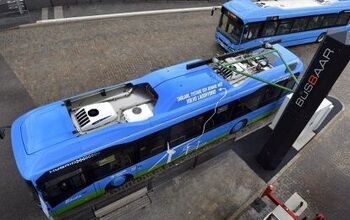England Studying "Charge As You Drive" Inductive Charging Roads

The British government is continuing on with a study of inductive charging on England’s busy A roads a reality, reports the BBC (via Gizmodo).
Feasibility of the technology hasn’t been fully proven as of yet, but England is getting one step closer by tendering bids for off-road trials. If off-road trials are successful, you might be able to drive long distances across the UK without needing to stop to recharge. The trials are expected to take 18 months from 2016 to 2017.
Elon, you might soon lose your killer app.
The technology has been used in the past in England and elsewhere to provide electricity for public transportation fleets. In Milton Keynes, metal plates were installed in the road to inductively charge buses, but those vehicles must stop in order to receive an electrical top up.
The long-term plan to install the technology in public roads might come to a halt even if the technology itself is proven to work in off-road trials. The cost to implement it on British roads combined with advances in battery technology may negate its viability.
However, this does open up the possibility of a whole new class of vehicle — that of the battery-less EV — which would likely be much more efficient as less mass would need motivation. Also, just imagine how roomy it would make the autonomous pods of the future.

More by Mark Stevenson


































Comments
Join the conversation
They'd have to implement a "Charge You as You Drive" form of taxation to pay for this boondoggle.
Just give us more cheap simple NEMA 14-50 RV outlets instead of all of this expensive complicated crap. Many of us already carry portable EVSEs, so we don't need to use the EVSE equipment that you typically see at L2 charging stations.
This would waste a lot of energy, and would require cars to be built specifically tuned to "couple" to the magnetic field - if you think that the differences in plug-in standards are a problem... It would make more sense to have individual pods that would run on existing rail beds, powered by the overhead wires. Just don't get caught between to commuter trains. Better batteries; ultracapacitors for better braking energy recovery, more efficiency - more "Supercharger"-like stations (for emergencies/long trips). We hate public transit (even if it's usable on our commute) because we don't like/trust/tolerate our fellow citizens, thus, we'll spend 1/3 of our income to avoid it; or come up with harebrained ideas like this.
While they're at it, they can put in runway lights for the flying cars.